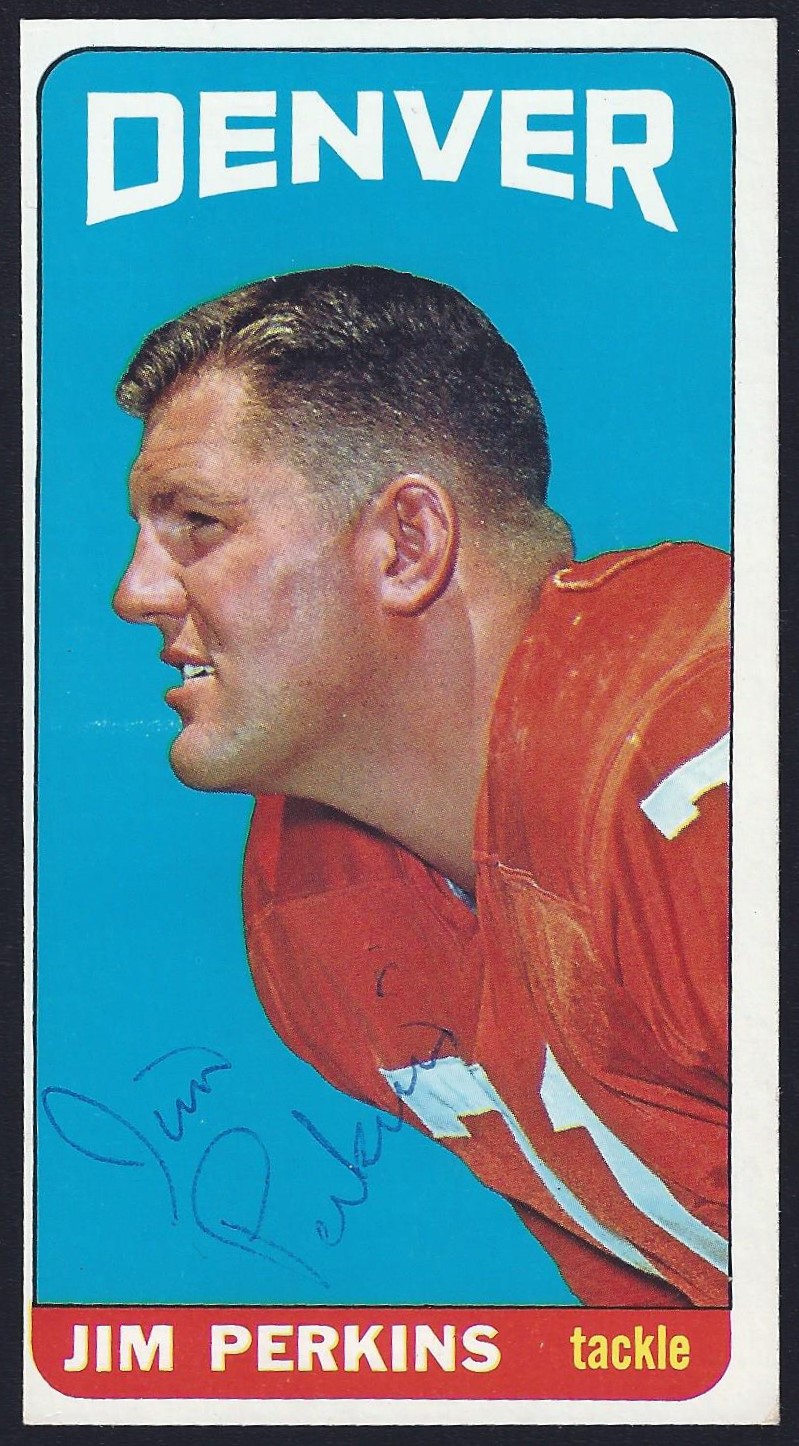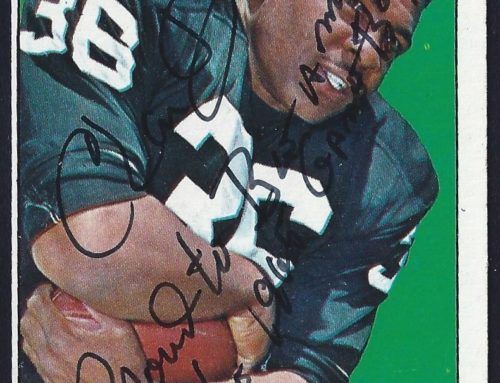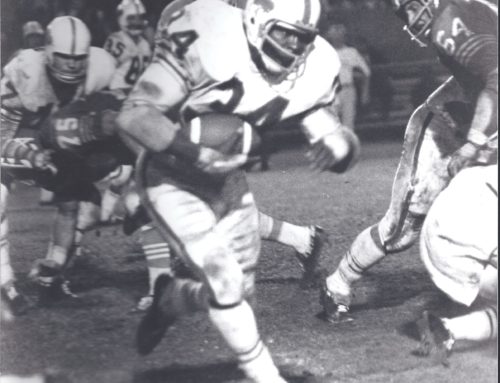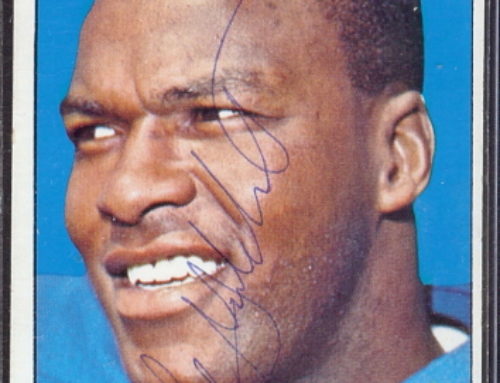I made a significant addition to my card collection recently when I located and purchased an autographed 1965 Topps Jim Perkins card.
Significant?
Who?
Jim Perkins?
Why?
Ok, so maybe Jim Perkins isn’t significant to 1965 Topps (or the AFL in general) in the same way as Joe Namath, but for autographed card collectors, this comes along, well… so far, once-in-a-lifetime.
Jim Perkins was born in Loyalton, California, on June 16, 1939. According to the 1964 Denver Broncos media guide, Perkins earned 12 varsity letters at Loyalton High School. He studied business administration at the University of Colorado-Boulder where he was a member of CU’s Big Eight championship teams, and was drafted in the 7th round of the 1962 NFL Draft by the Philadelphia Eagles, and by the Denver Broncos in the 24th round of the AFL Draft of the same year. Perkins earned a starting spot on the Broncos offensive line as a rookie, was single (at least in 1964), and worked as a realtor in the off-season. Beyond that, nothing.
Pro-football-reference.com tells us that Jim Perkins started all 14 games for the Broncos in each of his three seasons, 1962-1964. The man was tough and durable. After 1964, however, nothing.
It so happens that 1964 was Jim Perkins last season with the Broncos; in fact, it was his last season in football. After that, he appears to have faded from the spotlight. Multiple internet searches bring back nothing other that statistical pages and postings about his lone football card, 1965 Topps #61. The card itself, in fact, is a bit of an oddity. It was issued during Perkins’ first year of retirement from the game, something that Topps usually only reserved for very high-profile players, or at least players who were much more prominent than Jim Perkins.
The final note that the football sites agree upon, which is dated some 28 years after his retirement from football, is that Jim Perkins passed away on July 24, 1992. What caused his passing at the age of 53? No idea.
I’m thrilled to have the card in my collection. It brings me down to just one card needed to complete my fully-autographed 1965 Topps set (that last card is Bobby Jancik, former Houston Oilers defensive back and kick returner). But I would be amiss if I didn’t say that I wish that I knew a bit more about Jim Perkins. By all accounts he had the beginnings of a good career. Did he suffer a career-ending injury? Did a better business opportunity arise? Did he get cross ways with a coach? Or did he just tire of the game? I have no idea, but someday I hope to.





Todd
I did a quick internet search, and, understanding there is much erroneous info out there, this info from Mile High Report: players who wore # 71 for the Denver Broncos (according to the link Perkins never started a single game for Denver in his 3 seasons; if true, it might explain his departure from the game.)
“Jim Perkins T 1962-64
Drafted by the Broncos in the 21st round (162nd overall) of the 1962 AFL Draft. He was also selected by the Eagles in the 7th round (86th overall) of the 1962 NFL Draft. He opted to play for the Broncos. He appeared in 42 games with 0 starts.”
http://www.milehighreport.com/2011/6/12/2218422/denver-broncos-greats-by-the-numbers-71
Interesting… According to the 1964 Broncos Media Guide, Perkins was a “Third year man who earned starting post in rookie season and came fast.” However, according to Pro-Football-Reference.com, Perkins played in all 14 games in each of his three seasons, but started none. Here is the link to his page: http://www.pro-football-reference.com/players/P/PerkJi20.htm
Not sure what to believe. Probably the Pro Football Reference link.
The NFL apparently did not keep stats on how many games a player started before 1991.
Todd
I’m not sure/shy typos, would probably rely moreso on the Broncos Media Guide but who knows. Researched PFR before posting my original response; perhaps Mile High Report relied on PFR’s information. In my experience, unless one has first-hand knowledge, accuracy is often hit or miss when relying anyone’s statements – or publication/newspaper too that matter.
Three examples:
Usually when a story on Warren Wells is written, it most never references any teams but DET & OAK re: his career, when in fact he was also a Chief but for a short time pre-season ’67.
Or that George Blanda was variously a) released by HOU & retired in 1967, or, b) was traded to Oakland for a draft choice (my understanding, he was released and then signed by OAK as a free agent; if one is a stickler for details & getting things right, it matters.)
An example of a mistype or misquote changing the complexion an statement: aft Superbowl 1, a national magazine quoted Packer Jerry Kramer as having stated late in that game to his teammate Forrest Gregg re: Chief DE Jerry Mays & DT Andy Rice:
“You take my man (Rice) this time & I’ll take old idle (Mays) over there” – the implication being Mays was a non-factor in the game, which in fact was not the case. In fact, Mays reportedly ‘idolized’ the Packers Gregg, who preceded him in college at SMU; Kramer was still needling Mays, but as to a different specific. Mays quoted response, which would suffice in either case: “they really know how to hurt a guy.”
Recently found this somewhat off topic but timely bit of info: now 50 years aft Superbowl 1, here’s an ‘where are they now’ story via the KC Star, where former Chiefs of 1966 are (click the link to the team picture/see individual players.)
http://www.kansascity.com/sports/nfl/kansas-city-chiefs/article58496838.html
Filed under the category ‘things I still remember’ half a century later, the name of every guy pictured that photo, including those not named whom never played for the Chiefs any regular or post season game, only training camp/preseason tenure.
Of note, the guy at the bottom left #15 is Wendell Tucker.. he is another example of a guy who didn’t make it with the Chiefs/AFL yet became an NFL player (he even starred in 1969, a nice season for the Los Angeles Rams, further affirmation that for all its poo-pooing the AFL, NFL was not above utilizing former AFL players.
Great “where are they now” link, afl.
Todd: The Denver Broncos cut Jim Perkins on Aug. 23, 1965 along with eight other players, according to the NY Times (Aug. 24, 1965 p.24).
Jim Perkins did start every game for three season for the Broncos. He hurt his knee in College and in the Bronco’s training camp during 1965 his knee was really bothering him. His coach did not care that his knee was really bothering him. Jim was known for always being in great shape at the start of camp which back then many players were not in shape when camp started. Jim tired of his coach riding him for not fully participating in practice and his knee was really swollen and bothering him so he quit the team. The Eagles called him immediately and told him that while they would not guaranty that he would start the guaranteed that he would make the team if he hoped on a train and got to Philly ASAP. Jim decided to give up football and took a job with Procter and Gamble making 25% less than what he was making with the Broncos and he got a company car. Jim got married in 1966 and had his first son Shawn in Denver in 1968 he soon moved to California and started a glue company with 3 other men and sold glue to Coors, Henry Weinhard’s Beer, Korbel’s champagne, many other wineries in California, Del Monte foods, and saw mills all over the west and Canada and paper and box companies like Boise Cascade. Jim second son Jason came in 1969. Jim two sons played College football Shawn at Eastern Oregon State University and Jason at the University of Colorado. Jason and Jim are the only father and son players to win Conference football championships at the University of Colorado Jim in 1961 and Jason in 1989, 90, and 91. Jim died of a heart attack in 1992 even though he had been a life long fitness junky and ate healthy his entire life. Jim divorced his first wife in 1975 and raised his boys on his own until 1986 when he married Frances “Rusty” Perkins who he was very happily married to until his death.
I can also validate the card was in fact signed by Jim Perkins
… [Trackback]
[…] Here you will find 33758 more Information on that Topic: talesfromtheamericanfootballleague.com/who-was-jim-perkins/ […]
… [Trackback]
[…] Find More on that Topic: talesfromtheamericanfootballleague.com/who-was-jim-perkins/ […]
… [Trackback]
[…] Find More on that Topic: talesfromtheamericanfootballleague.com/who-was-jim-perkins/ […]
… [Trackback]
[…] Here you will find 7593 more Information on that Topic: talesfromtheamericanfootballleague.com/who-was-jim-perkins/ […]
… [Trackback]
[…] There you can find 38192 additional Information to that Topic: talesfromtheamericanfootballleague.com/who-was-jim-perkins/ […]
… [Trackback]
[…] Find More on that Topic: talesfromtheamericanfootballleague.com/who-was-jim-perkins/ […]
… [Trackback]
[…] Read More Info here on that Topic: talesfromtheamericanfootballleague.com/who-was-jim-perkins/ […]
… [Trackback]
[…] Find More here on that Topic: talesfromtheamericanfootballleague.com/who-was-jim-perkins/ […]
… [Trackback]
[…] Read More Information here to that Topic: talesfromtheamericanfootballleague.com/who-was-jim-perkins/ […]
… [Trackback]
[…] Info on that Topic: talesfromtheamericanfootballleague.com/who-was-jim-perkins/ […]
… [Trackback]
[…] There you can find 17604 additional Information to that Topic: talesfromtheamericanfootballleague.com/who-was-jim-perkins/ […]
… [Trackback]
[…] Here you will find 10920 more Info to that Topic: talesfromtheamericanfootballleague.com/who-was-jim-perkins/ […]
… [Trackback]
[…] Read More on to that Topic: talesfromtheamericanfootballleague.com/who-was-jim-perkins/ […]
… [Trackback]
[…] Information to that Topic: talesfromtheamericanfootballleague.com/who-was-jim-perkins/ […]
… [Trackback]
[…] Read More Info here to that Topic: talesfromtheamericanfootballleague.com/who-was-jim-perkins/ […]
… [Trackback]
[…] Find More here on that Topic: talesfromtheamericanfootballleague.com/who-was-jim-perkins/ […]
… [Trackback]
[…] There you can find 69209 additional Information to that Topic: talesfromtheamericanfootballleague.com/who-was-jim-perkins/ […]
… [Trackback]
[…] Find More Information here on that Topic: talesfromtheamericanfootballleague.com/who-was-jim-perkins/ […]
… [Trackback]
[…] There you will find 21262 more Information on that Topic: talesfromtheamericanfootballleague.com/who-was-jim-perkins/ […]
I really like the way that you have expressed yourself. There is a lot to be admired from this post. You might want to click on
Spider Varse Leather Vest
… [Trackback]
[…] Information on that Topic: talesfromtheamericanfootballleague.com/who-was-jim-perkins/ […]
… [Trackback]
[…] Find More to that Topic: talesfromtheamericanfootballleague.com/who-was-jim-perkins/ […]
… [Trackback]
[…] Find More to that Topic: talesfromtheamericanfootballleague.com/who-was-jim-perkins/ […]
… [Trackback]
[…] Info to that Topic: talesfromtheamericanfootballleague.com/who-was-jim-perkins/ […]
… [Trackback]
[…] Find More on that Topic: talesfromtheamericanfootballleague.com/who-was-jim-perkins/ […]
… [Trackback]
[…] Info to that Topic: talesfromtheamericanfootballleague.com/who-was-jim-perkins/ […]
… [Trackback]
[…] Here you will find 50788 additional Information on that Topic: talesfromtheamericanfootballleague.com/who-was-jim-perkins/ […]
… [Trackback]
[…] Read More Info here on that Topic: talesfromtheamericanfootballleague.com/who-was-jim-perkins/ […]